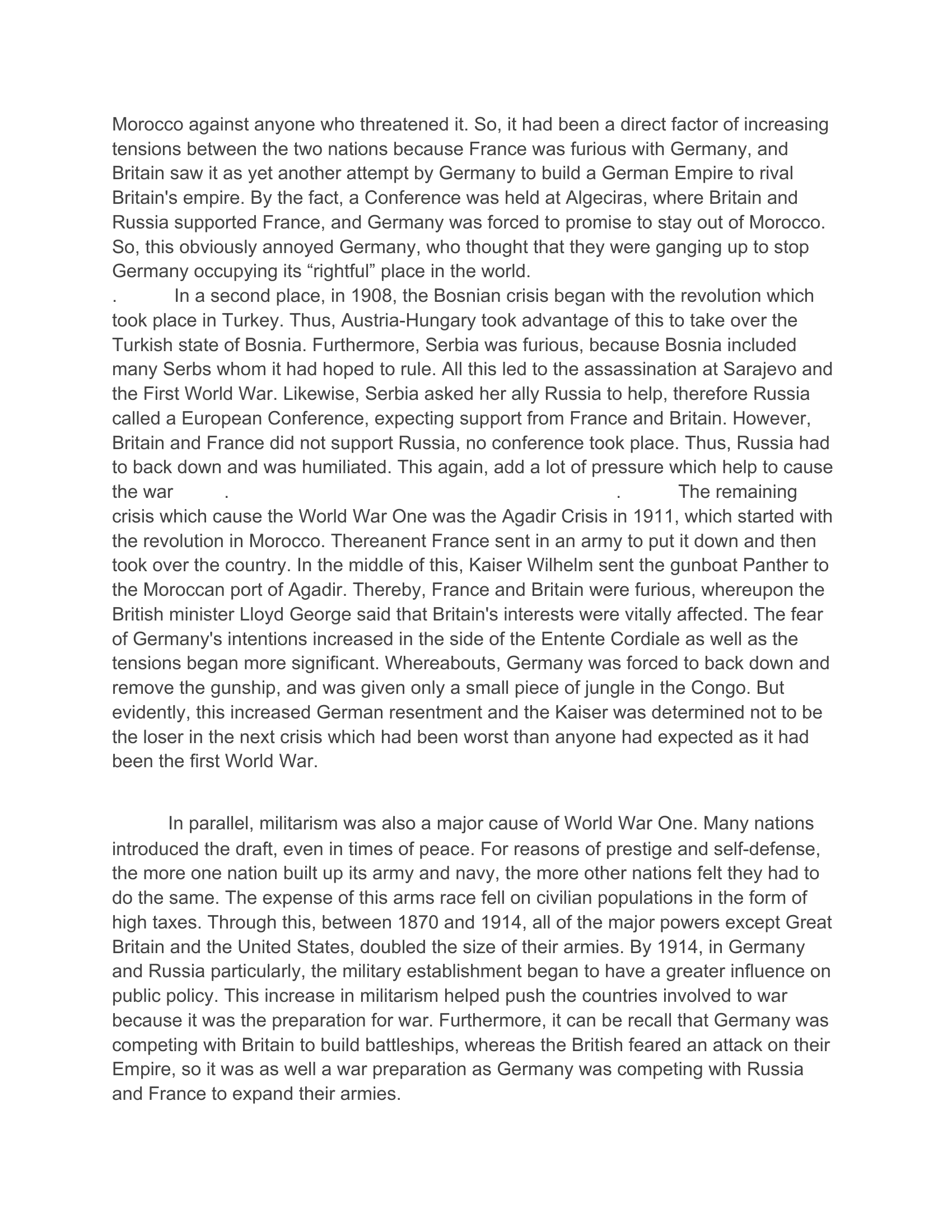ESSAY : Main causes for WWI
Publié le 24/02/2015

Extrait du document
« M orocco against anyone w ho threatened it. S o, it had been a direct factor of increasing tensions betw een the tw o nations because France w as furious w ith G erm any, and B ritain saw it as yet another attem pt by G erm any to build a G erm an E m pire to rival B ritain's em pire. B y the fact, a C onference w as held at A lgeciras, w here B ritain and R ussia supported France, and G erm any w as forced to prom ise to stay out of M orocco. S o, this obviously annoyed G erm any, w ho thought that they w ere ganging up to stop G erm any occupying its “rightful” place in the w orld. . In a second place, in 1908, the B osnian crisis began w ith the revolution w hich took place in Turkey. Thus, A ustriaH ungary took advantage of this to take over the Turkish state of B osnia. Furtherm ore, S erbia w as furious, because B osnia included m any S erbs w hom it had hoped to rule. A ll this led to the assassination at S arajevo and the First W orld W ar. Likew ise, S erbia asked her ally R ussia to help, therefore R ussia called a E uropean C onference, expecting support from France and B ritain. H ow ever, B ritain and France did not support R ussia, no conference took place. Thus, R ussia had to back dow n and w as hum iliated. This again, add a lot of pressure w hich help to cause the w ar . . The rem aining crisis w hich cause the W orld W ar O ne w as the A gadir C risis in 1911, w hich started w ith the revolution in M orocco. Thereanent France sent in an arm y to put it dow n and then took over the country. In the m iddle of this, K aiser W ilhelm sent the gunboat P anther to the M oroccan port of A gadir. Thereby, France and B ritain w ere furious, w hereupon the B ritish m inister Lloyd G eorge said that B ritain's interests w ere vitally affected. The fear of G erm any's intentions increased in the side of the E ntente C ordiale as w ell as the tensions began m ore significant. W hereabouts, G erm any w as forced to back dow n and rem ove the gunship, and w as given only a sm all piece of jungle in the C ongo. B ut evidently, this increased G erm an resentm ent and the K aiser w as determ ined not to be the loser in the next crisis w hich had been w orst than anyone had expected as it had been the first W orld W ar. In parallel, m ilitarism w as also a m ajor cause of W orld W ar O ne. M any nations introduced the draft, even in tim es of peace. For reasons of prestige and selfdefense, the m ore one nation built up its arm y and navy, the m ore other nations felt they had to do the sam e. The expense of this arm s race fell on civilian populations in the form of high taxes. Through this, betw een 1870 and 1914, all of the m ajor pow ers except G reat B ritain and the U nited S tates, doubled the size of their arm ies. B y 1914, in G erm any and R ussia particularly, the m ilitary establishm ent began to have a greater influence on public policy. This increase in m ilitarism helped push the countries involved to w ar because it w as the preparation for w ar. Furtherm ore, it can be recall that G erm any w as com peting w ith B ritain to build battleships, w hereas the B ritish feared an attack on their E m pire, so it w as as w ell a w ar preparation as G erm any w as com peting w ith R ussia and France to expand their arm ies. . »
↓↓↓ APERÇU DU DOCUMENT ↓↓↓
Liens utiles
- regional inequalities oib type essay
- Essay about "Success" in I Am Charlotte Simmons
- deuxiemme guerre mondiale causes et consequences
- deuxiemme guerre mondiale causes et consequences
- Essay Islam in the UK


